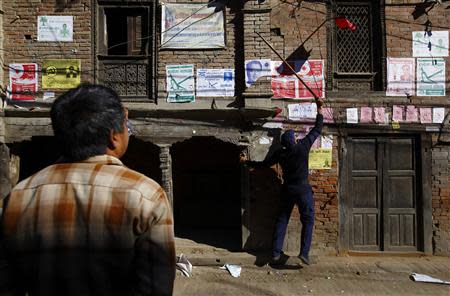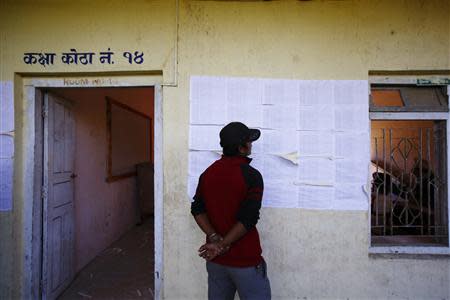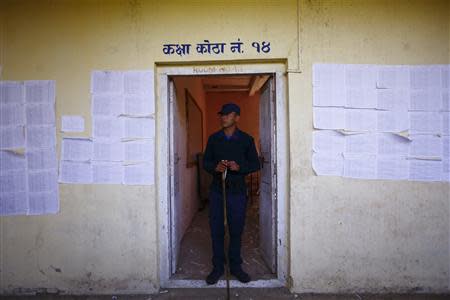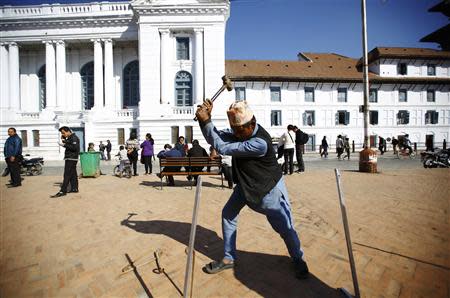Nepal's revolutionary leader loses his appeal as nation limps to the polls
By Sanjeev Miglani and Gopal Sharma CHAPAGAUN, Nepal (Reuters) - - Widow Narayan Kumari Ghimire has lost faith in Nepal's powerful Maoists: the only reason they will get her vote in Tuesday's election is because her son died fighting for them during the insurrection that ended seven years ago. For Ghimire, 62, the one-time guerrillas have turned out to be no better than the rest of Nepal's grasping and ever-bickering politicians since they took off their red bandanas, gave up arms and tasted power in a 2008 election. "They are corrupt, they live in big houses. They have not done anything for the families of those who sacrificed their lives," she said at an election rally outside the capital Kathmandu. "But I will vote for them because I have a blood relationship, because of my son," said Ghimire, standing in open ground ringed by snow-capped mountains Wedged between India and China, Nepal will elect a new assembly to write a constitution following the abolition of the 240-year-old feudal monarchy that the Maoists fought against. The Himalayan nation, the size of Greece, has lurched from one political crisis to another over the past five years since a first attempt to agree on a charter failed, leaving space for militant groups and criminal gangs to thrive. Five governments - two of them headed by the Maoist party - have come and gone as politicians wrangled over the structure of the proposed new republic and how it should be governed. Economic growth in Nepal, where nearly a quarter of its 27 million people live below the poverty line, has hovered around 3.5 percent over the past 10 years, much lower than the pace achieved by China and India on its doorstep, forcing many people to seek work abroad. Much of the ire for the drift is directed against Prachanda, the 58-year-old Maoist revolutionary whose party, riding a wave of hope in a war-weary nation, won the largest number of seats in the first constituent assembly that also functioned as the parliament. Named prime minister, Prachanda promised to stitch together a republic from the nation's 103 ethnic groups and turn it into a modern-day Switzerland. He also offered sweeping land reform in a country where 80 percent of the people live off farming. He failed on both counts. FROM JUNGLES TO THE CORRIDORS OF POWER Critics say the most noticeable change has been Prachanda's lifestyle. He has gone from an enigmatic guerrilla commander living in the jungles to the nation's top politician. One former Maoist colleague slapped him at a rally last year, saying he had strayed too far from the ideals of the movement, which waged a bloody insurrection that killed 16,000 people. "The amount of wealth they have amassed, they can be comfortable for decades," said Bipin Adhikary, a constitutional lawyer and independent commentator. Prachanda's campaign is the best-resourced in the country, outstripping those of his rivals, including the Nepali Congress, the party that has wielded power the longest. The balding leader with a slight pot belly criss-crosses Nepal in helicopters while others struggle to get around, sometimes going on horseback. With vermillion smeared on his forehead and garlanded with marigolds, the Maoist leader - who dresses in a Western suit these days - is undoubtedly the best-known face of the election. A daughter and a daughter-in-law are also standing in the polls, which critics say smacks of nepotism. "He is a completely different person from what he was in the insurgency," said a former Indian diplomat who served in Kathmandu. "The exuberance of fighting in the trenches very soon gave way to politicking." COMPROMISE KEY TO FUTURE REPUBLIC Despite the popular disillusionment with Prachanda, he remains key to resolving the political impasse. He has urged voters to give the Maoists a clear majority so that the transformation from the deposed monarchy to a federal republic can be enshrined in a new constitution. None of the big three parties - the Maoists, the Nepali Congress or the United Marxist Leninist - are expected to win a majority in the 601-seat assembly, but Prachanda held out the prospect of a compromise to reach a consensus on the charter. "This is our last chance, we must do everything we can to draft a constitution," he told Reuters in his walled mansion in an upmarket part of Kathmandu. The Maoists want Nepal to be divided into 13 states, responding to the demands of the various ethnic and linguistic groups they mobilized during the civil war. The other political parties have opposed this, saying it could unleash ethnic tensions that the monarchy had kept a lid on, and have pressed for the new states to be established along multi-ethnic, multi-lingual and multi-religious lines. Prachanda did not spell out what the compromise might be, but other Maoist leaders have said privately it could involve scaling back the proposed number of states. But his political maneuvering is viewed with disgust by many who once admired the Maoists. "When they couldn't look after the family of martyrs, who else will they look after?" said widow Ghimire. "People are suffering, they don't have clothes to wear, a roof over their heads." (Corrects number of people killed in revolt, paragraph 13) (Editing by John Chalmers and Michael Perry)




